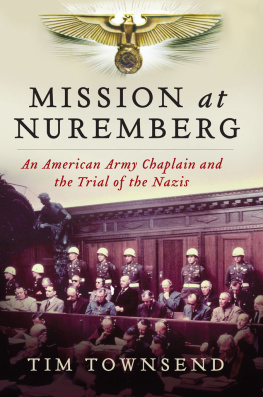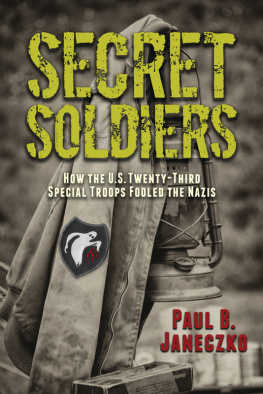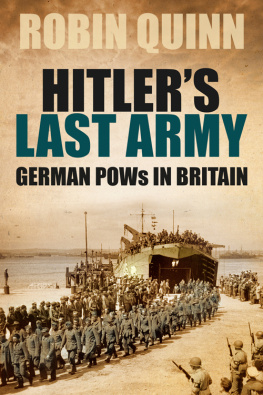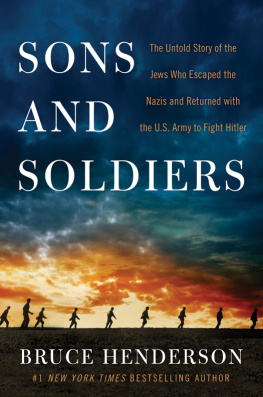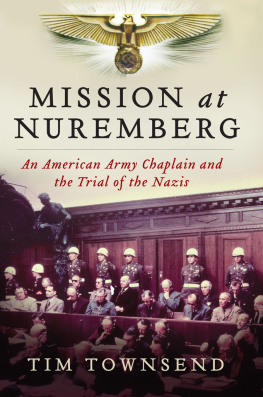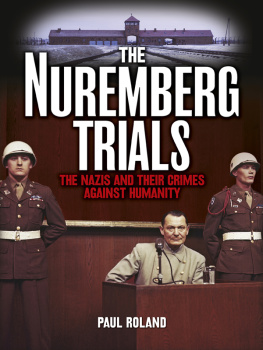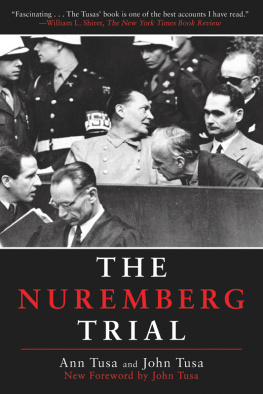For my grandparents: Eleanor and H. Lee Townsend and Margaret and Arthur Harrington. My grandfathers served in the U.S. Navy during the Second World War. One, the son of a Michigan farmer, served in the Pacific; the other, the son of a New York City office manager, as part of a combat aircrew strafing German U-boats in the Atlantic.
Do not be overcome by evil, but overcome evil with good.
ROMANS 12:21
Contents
There had been men who had thought they could make a pet of cruelty, and the grown beast had flayed them.
REBECCA WEST
W ILHELM KEITEL HAD BEEN general field marshal, second only to Adolf Hitler in Germanys military hierarchy. Now, on a cold, rainy October morning, at 1:00 A.M. in 1946, he stood shackled to a guard outside cell 8 of Nurembergs Palace of Justice. In half an hour, Keitel would be hanging by his neck from a rope, his hands tied behind his back with a leather bootlace, a black hood over his head. Outside the prison, no moon marked the sky above the destroyed city of Nuremberg.
The prisons commandant, U.S. Army colonel Burton Andrus, spoke loudly, with both custom and history in mind. His voice was high pitched but authoritative, and it echoed off the prisons dull stone walls and traveled up the metal staircases, past the mesh wiring that had been strung across the three tiers of cells to prevent suicides. It traveled past a small chapel that had been created by knocking down the wall between two cells.
Andrus felt the weight of the moment, but he didnt relish it. He walked along the cell block on the first level, stopping at each prisoners cell and repeating his sentence. The men had heard the same words two weeks earlier when the justices of the International Military Tribunal read the verdicts and sentences aloud in court.
The colonel was simply going through with a formalityrequired by the armys standard operating procedure and the Geneva Convention. The men in these cells were the former elite of the Third Reich, but they had long since been stripped of any military rank or privilege. In Nurembergs prison, they were treated by most as persons without status.
The other major war criminalsthose who had avoided the tribunals supreme penalty and had been moved to the prisons second tiercould hear the details of each sentence as Andrus stopped at the cells. So could those on the third tier, the lesser Nazi criminals, used as witnesses by prosecution attorneys for testimony that had convicted the men below.
Andruss strict adherence to by-the-book army rules and regulations had become something of a joke among the courtroom lawyers, and a headache to the twenty-one Nazis in his care during the yearlong trial. Before being assigned to Nuremberg, Andrus had served under General George Patton. He idolized Patton and tried to emulate him. He once wrote to a friend, I will go anywhere with Georgie, anytime, for any purpose.
This morning Andrus was dressed, as he always was, in his green, four-pocket uniform tunic with brass buttons imprinted with the United States coat of armsan eagle carrying thirteen arrows in one talon and an olive branch in the other. The colonel wore a burnished steel olive-drab helmet and carried a riding crop tucked under his arm.
Andrus was anxious and annoyed as he eyed Keitel. This was the date the tribunal had set for the executions, and while the prisoners didnt know it officially, most of them had guessed these were their final hours. Earlier in the night, Hermann Goering, Germanys former reichsmarshal, Hitlers designated successor and the former head of Germanys air force, had killed himself by swallowing cyanide, cheating justice and outfoxing Andrus, who had vowed that his prison would be suicide-free. The commotion that followed Goerings death had woken the other prisoners. At 12:45 A.M. , they were told to dress and were given their last meal: sausage, potato salad, cold cuts, black bread, and tea.
Most didnt touch the food. Keitel had made his bed and asked for a brush and duster to clean his cell.
Like Andruss, Keitels life had been ruled by army regulations. Since his capture by the Allies eighteen months earlier he had played the part of a disciplined soldier. His bearing was erect, his silver hair and mustache always perfectly trimmed. A year earlier, when Keitel arrived at the Nuremberg prison, Andrus had torn the shoulder boards from the generals uniform. Hed told Keitel he was no longer a soldier; he was now a war criminal. Nevertheless, each day in court, Keitel had proudly worn the plain tunic, blooming breeches, and black boots of a Wehrmacht officer. Keitels defense attorney had played on the notion of following orders. He had only been doing a job hed trained for his entire life. Keitels commanding officer was the fhrer, and questioning orders was never even a consideration.
The tribunal had seen it differently. Superior orders, even to a soldier, cannot be considered in mitigation where crimes so shocking and extensive have been committed, the justices had said about Keitels defense. They found him guilty on all four counts of the Nuremberg indictment. When the justices told Keitel hed been sentenced to death, the general nodded curtly and left the courtroom.
Now Keitel was hearing his sentence for the second and final time. Defendant Wilhelm Keitel, Andrus announced, on the counts of the indictment on which you have been convicted, the Tribunal has sentenced you to death by hanging.
Once Andrus had moved to the next prisoner and Keitel had returned into his cell, a stocky man with glasses, receding gray hair, and a doughy face followed the field marshal to his cot. Chaplain Henry Gerecke, a captain in the U.S. Army, was carrying a Bible. He asked Keitel if hed like to pray.
Gerecke (rhymes with Cherokee) had also been rattled by Goerings suicide. An ocean away, Gereckes St. Louis Cardinals had been battling the Boston Red Sox in the World Series. The prisons other chaplain, Father Sixtus OConnor, was rooting for the Sox. Though from upstate New York and really a Dodgers fan, hed chosen Boston in a bet with Gerecke. They had been in the guards booth on the prison floor awaiting a telephone call when Goering bit down on the cyanide. With the Palace of Justice locked down for the executions, the only way the chaplains and guards had of receiving updates after each half inning was through phone calls from an American officer outside the prison walls. Just after a call came in that Bostons Dom DiMaggio had doubled in the top of the eighth, driving in two runs to tie St. Louis, Goerings guard began yelling that something was wrong; Gerecke was the first to get to the reichsmarshal as he died.
Two hours later, Gerecke was with Keitel. They sank to their knees in Keitels cell, and Gerecke began to pray in German. Andruss words must have triggered in Keitel the realization that his life was over, because his soldierly demeanor was suddenly shattered. His voice faltered. His prayer trailed off. He began to weep, then sobbed uncontrollably, his body jerking as he gasped for air. Gerecke raised his hand above Keitels head and gave the general a final benediction. Most likely it was Martin Luthers favorite, from the book of Numbers: The Lord bless you, and keep you; The Lord make his face shine on you, and be gracious to you; The Lord lift up his countenance on you, and give you peace. Then the chaplain was called to the next cell, and he rose to his feet.
A LITTLE MORE THAN three years earlier, on June 3, 1943, Henry Gerecke was late for dinner. He burst through the front door and bounded up the wide wooden steps, two and three at a time, leading to the three-bedroom apartment at 3204 Halliday Avenue in south St. Louis that he shared with his wife, three sons, and sister-in-law. Gereckes wife, Alma, was the only one home. Her younger sister, Ginny, was out. The couples youngest son, fifteen-year-old Roy, was at a church youth group meeting. Gereckes two older sons had already joined the army. The eldest, twenty-two-year-old Hank, was in the Aleutian Islands, fighting off the Japanese threat to the North American mainland. Twenty-one-year-old Carltoneveryone called him Corkywas training at Fort Bliss, Texas, for the Normandy invasion that would take place the next year.

